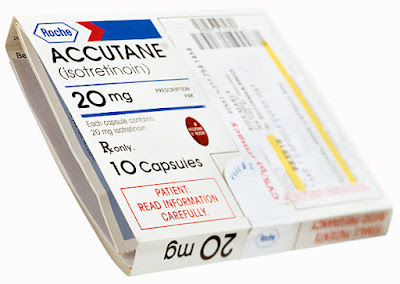Introduction:
Isotretinoin,
often sold under the brand name Accutane, is a potent oral prescription
medication specifically designed to target the sebaceous glands, providing an
effective solution for individuals battling severe acne. This article will
delve into the uses, side effects, warnings, precautions, interactions, and
potential overdose concerns associated with isotretinoin.
Uses:
Isotretinoin
is primarily prescribed to treat severe acne that has not responded to other
conventional treatments. Severe acne can be characterized by nodules, cysts,
and persistent inflammation, causing physical and emotional distress.
It works by reducing the production of sebum, the skin's natural oil,
and inhibiting the development of acne-causing bacteria. This medication is
often considered a last resort due to its potency and potential side effects.
Side Effects:
While
isotretinoin has proven to be highly effective in treating severe acne, it is
not without its side effects. Common side effects include dry skin, lips, and
eyes, as well as potential sensitivity to sunlight. Patients may also
experience muscle and joint pain, nosebleeds, and changes in vision.
Additionally, isotretinoin has been associated with more serious side effects
such as depression, mood swings, and in rare cases, suicidal thoughts.
Therefore, it is crucial for patients to be closely monitored by healthcare
professionals during treatment.
Benefits:
Highly Effective Acne Clearance: Isotretinoin is
renowned for its unparalleled efficacy in treating severe acne that has proven
resistant to other conventional therapies. The medication targets the root
causes of acne by significantly reducing sebum production, leading to a
remarkable improvement in acne symptoms.
Long-Term Remission: Many patients experience long-term remission or even permanent resolution of severe acne after completing a course of isotretinoin treatment. This prolonged effect sets it apart from other acne medications that may provide only temporary relief.
Prevention of Scarring: Severe acne often leaves behind scars that can be both physical and emotional. Isotretinoin's ability to effectively treat nodular and cystic acne helps prevent the formation of deep scars, promoting smoother and healthier-looking skin.
Reduced Acne-Related Inflammation: This capsule not only targets the visible symptoms of acne but also addresses the underlying inflammation. By doing so, it helps alleviate the redness, swelling, and discomfort associated with extreme acne, contributing to an overall improvement in skin health.
Improvement in Quality of Life: Severe acne can
significantly impact an individual's quality of life, affecting self-esteem and
confidence. There's success in treating terrible acne often leads to
improved psychological well-being, allowing individuals to regain their self-confidence and enjoy a
better quality of life.
Prevention of Recurrent Acne
Lesions: It has been shown to reduce the likelihood of future
acne breakouts. By addressing the factors that contribute to acne development,
such as excessive sebum production and bacterial overgrowth, isotretinoin helps
in preventing the recurrence of extreme acne lesions.
Positive Impact on Oiliness: Excessively oily
skin is a common concern in individuals with severe acne. Isotretinoin not only
reduces sebum production but also helps normalize the skin's oiliness, leading
to a more balanced complexion.
Treatment for Acne Unresponsive
to Other Therapies: It serves as a valuable treatment option for
individuals whose severe acne has not responded adequately to other medications
or topical treatments. Its effectiveness in such cases positions it as a
crucial tool in the dermatologist's arsenal.
Management of Comorbidities: Severe acne can
sometimes be associated with other dermatological conditions. Accutane comprehensive approach to acne treatment often results in the simultaneous
improvement of related skin issues, providing a holistic solution for patients.
Personalized Treatment Plans: Accutane treatment plans are tailored to individual patient needs. Dermatologists
carefully consider factors such as the severity of acne, medical history, and
lifestyle, ensuring a personalized approach that maximizes benefits while
minimizing potential risks.
While the benefits of isotretinoin in treating severe acne are
substantial, it is crucial for individuals considering this medication to weigh
the potential risks and side effects in consultation with their healthcare
providers. Open communication and close monitoring during treatment contribute
to a safer and more effective experience with isotretinoin.
Warnings:
Several
warnings accompany the use of isotretinoin. Pregnant women should avoid
isotretinoin as it is known to cause severe birth defects. Female patients are
required to use two forms of birth control during treatment, and regular
pregnancy tests are mandatory. It is equally important for male patients to
exercise caution, as isotretinoin may impact sperm production. Patients with a
history of mental health issues should be closely monitored, and any signs of
depression or mood changes should be reported to healthcare providers
immediately.
Precautions:
Before
starting isotretinoin treatment, patients must disclose their entire medical
history to their healthcare provider. This includes any allergies, liver
disease, diabetes, or psychiatric disorders. Alcohol consumption should be
minimized or avoided during isotretinoin therapy, as it may exacerbate certain side
effects. Regular check-ups are essential to monitor progress and address any
emerging concerns promptly.
Interactions:
Isotretinoin
may interact with other medications, potentially affecting their efficacy or
causing adverse reactions. It is crucial for patients to inform their
healthcare providers of all the medications, supplements, and herbal products
they are taking. Tetracycline antibiotics, vitamin A supplements, and certain
birth control pills are among the medications that may interact with isotretinoin.
Overdose:
While
cases of Accutane overdose are rare, it is essential for patients to adhere
strictly to their prescribed dosage. Overdose symptoms may include severe
headache, dizziness, vomiting, and stomach pain. In case of suspected overdose,
seeking immediate medical attention is imperative.



1 Comments
Very useful for those who have severe acne problem. Dr skin thanks for recommendations
ReplyDelete